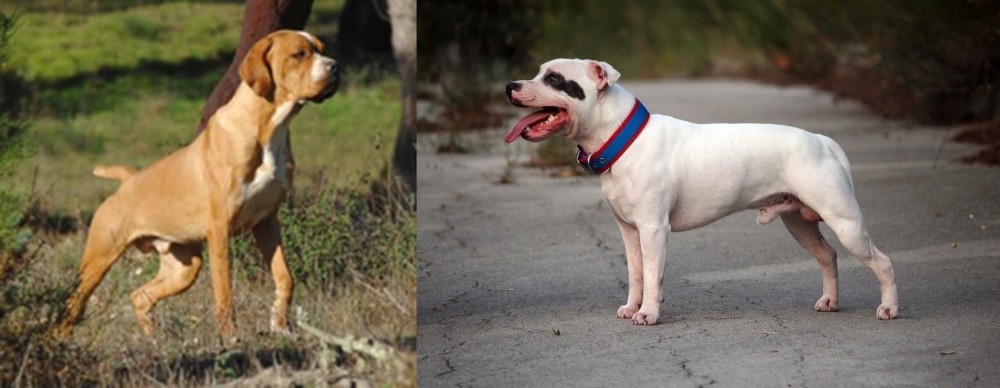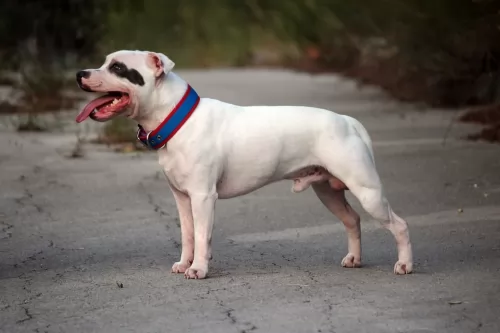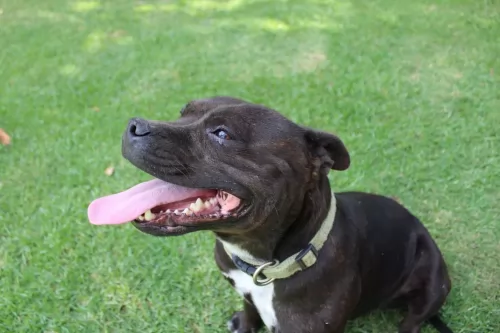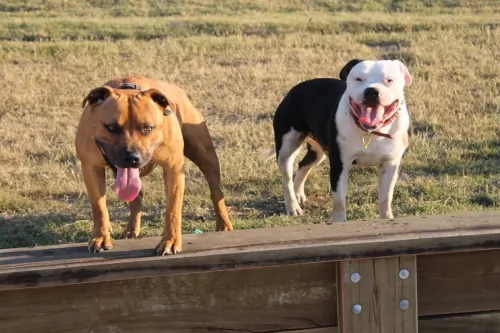 Petzlover
Petzlover Portuguese Pointer is originated from Portugal but Staffordshire Bull Terrier is originated from United Kingdom. Portuguese Pointer may grow 19 cm / 8 inches higher than Staffordshire Bull Terrier. Portuguese Pointer may weigh 10 kg / 23 pounds more than Staffordshire Bull Terrier. Both Portuguese Pointer and Staffordshire Bull Terrier has almost same life span. Both Portuguese Pointer and Staffordshire Bull Terrier has almost same litter size. Both Portuguese Pointer and Staffordshire Bull Terrier requires Low Maintenance.
Portuguese Pointer is originated from Portugal but Staffordshire Bull Terrier is originated from United Kingdom. Portuguese Pointer may grow 19 cm / 8 inches higher than Staffordshire Bull Terrier. Portuguese Pointer may weigh 10 kg / 23 pounds more than Staffordshire Bull Terrier. Both Portuguese Pointer and Staffordshire Bull Terrier has almost same life span. Both Portuguese Pointer and Staffordshire Bull Terrier has almost same litter size. Both Portuguese Pointer and Staffordshire Bull Terrier requires Low Maintenance.
 The Portuguese Pointer comes from Portugal where the dog was developed as a gun dog. It is believed that the dog is descended from the Spanish Pointer and developed to point out game.
The Portuguese Pointer comes from Portugal where the dog was developed as a gun dog. It is believed that the dog is descended from the Spanish Pointer and developed to point out game.
The dog was was recognized by the United Kennel Club in 1996.
The dog was introduced to England in the 18th century and the modern type of the Portuguese Pointer became established in the early 1900’s when the breed had become endangered. A group of breeders re-established its numbers.
Today it is both working- and companion dog. The UK Kennel Club recognised it as a breed in 2014.
 The Staffordshire Bull Terrier was first developed in the northern sections of Birmingham and in Staffordshire, England. The Staffie is a cross between a Black and Tan Terrie and the Bulldog, but had other breeds crossed in over time in order to create a bull-baiting dog and a fighting dog. In the Victorian age these sports were banned but dog fighting went underground and continues on some level today.
The Staffordshire Bull Terrier was first developed in the northern sections of Birmingham and in Staffordshire, England. The Staffie is a cross between a Black and Tan Terrie and the Bulldog, but had other breeds crossed in over time in order to create a bull-baiting dog and a fighting dog. In the Victorian age these sports were banned but dog fighting went underground and continues on some level today.
The Staffordshire Bull Terrier was exceptional at these “sports” due to his build, power and jaw strength. Today’s Staffie is a descendent of those early Bull Terrier crosses. Together with the Bull Terrier and the American Pit Bull, the Staffie also traces its roots back to those original English Bully dogs. All three breeds have the Bulldog in common.
After dog fighting and bull baiting were banned the Stafforshire Bull Terrier was further developed as a companion and pet. Still their reputation as fighting dogs cost them recognition in the official kennel clubs for some time. They finally made the UK registry in 1935, but it was not until 1974 that the American Kennel Club (AKC) accepted them.
 Originating from Portugal, the attractive, almost Boxer-like looking dog is a medium sized purebred dog that stands at between 48 and 60cm in height and weighs roughly 16 to 27kg.
Originating from Portugal, the attractive, almost Boxer-like looking dog is a medium sized purebred dog that stands at between 48 and 60cm in height and weighs roughly 16 to 27kg.
The Portuguese Pointer has a coat that is light brown, tan or yellow. The dog has a short, easy to maintain coat. He has a fairly square face, much like the Boxer, floppy ears with a long tail. The tail is usually docked. The eyes are brown and he a bright, alert, kind expression.
The Portuguese Pointer is a dog with strong hunting instincts, but who still has time to make a splendid companion for his human family. He is gentle and loyal to his human family, being somewhat reserved with strangers. This is a good thing really as this makes him a good watchdog.
He is good with other pets in the home as well as with children. He badly wants to please his family, and because he is intelligent and a fast learner, you won’t have any trouble with training and socialization.
He is a sociable dog, loving to be close to its owner. He is active and will require quite a bit of exercise, loving to join in with games with the children. He gets on well with children in the home as well as with animals.
 The Staffordshire is a muscular, stocky and unusually strong breed, small to medium size in height and build. They have broad, powerful chests, wide set, strong legs, strong shoulders, broad head with a fairly short muzzle. Their ears are not cropped but they are short and fold over. The coat is stiff, close and short and the tail is medium and carried low. Most Staffies are brown, but they can be red, brindle with white, fawn, black, white or blue.
The Staffordshire is a muscular, stocky and unusually strong breed, small to medium size in height and build. They have broad, powerful chests, wide set, strong legs, strong shoulders, broad head with a fairly short muzzle. Their ears are not cropped but they are short and fold over. The coat is stiff, close and short and the tail is medium and carried low. Most Staffies are brown, but they can be red, brindle with white, fawn, black, white or blue.
 The gorgeous Portuguese Pointer makes such a loyal and loving pet. He is always looking out for his human family, making sure that they are safe and protected under his watch.
The gorgeous Portuguese Pointer makes such a loyal and loving pet. He is always looking out for his human family, making sure that they are safe and protected under his watch.
He is an excellent watch dog too, proudly running around outside and making sure that there are no intruders around. They are good with kids too if the kids are gentle and kind with animals.
He loves a good game too and is always ready to take part in any activities you’re taking part in. The Portuguese Pointer is truly an awesome pet and companion.
 1.Children friendliness The breed adores children but care should still be taken because they are so strong and their jaws are so powerful.
1.Children friendliness The breed adores children but care should still be taken because they are so strong and their jaws are so powerful.
2.Special talents they adore children and they one of the most powerful jaws among canines.
 Your robust Portuguese Pointer isn’t known to be a dog to suffer with too many breed related health problems. With good care he can reach 14 years of age.Portuguese Pointers are a healthy breed, but some health issues can crop up -
Your robust Portuguese Pointer isn’t known to be a dog to suffer with too many breed related health problems. With good care he can reach 14 years of age.Portuguese Pointers are a healthy breed, but some health issues can crop up -
Cancer is a leading cause of death in dogs young and old. Luckily, if caught early, cancer is curable. Some of the cancers found in dogs are malignant lymphoma – a tumor of the lymph nodes.
Skin cancer is also fairly common. The warning signs of cancer in dogs can be a new lump or a wound that won’t heal. While these are classic signs, sometimes there are no signs. If your dog isn’t feeling well, it’s time to get him to the veterinarian.
The liver is one of the vital body organs but it is susceptible to a wide variety of problems. It detoxifies the blood, stores vitamins and assists with digestion among other things.
One of the most common symptoms of liver disease is jaundice. When the liver isn’t functioning properly, bilirubin builds up in the blood and leads to the yellowish appearance of the dog.
Other common symptoms of liver disease include vomiting, weight loss and diarrhea. Veterinary attention will be required.
 • Patella luxation otherwise known as a slipped kneecap- can cause pain and some lameness.
• Patella luxation otherwise known as a slipped kneecap- can cause pain and some lameness.
• Skin allergies and even a tendency toward Mange which is chronic in some forms and fatal in others.
• Like most active dogs their size, they are susceptible to bloat which can be fatal if not treated immediately.
 The Portuguese Pointer has been a working dog and doesn’t enjoy lying around with nothing to do. Apart from a walk every day which he loves, he’ll want other activities that stimulate him mentally and physically.
The Portuguese Pointer has been a working dog and doesn’t enjoy lying around with nothing to do. Apart from a walk every day which he loves, he’ll want other activities that stimulate him mentally and physically.
His short coat means that he won’t require any special grooming. He does shed constantly, like many other dogs, and a good brush twice a week will keep his short coat vibrant and shiny.
Your canine friend will require protein in his diet as well as all the vitamins ad minerals for health. The very best commercially manufactured dog foods will be required for his health.
The dry kibble can be a wonderful convenient way to feed your pet. The best commercial foods meet the requirements for a dog’s diet. Give him some delicious home made food too. Boiled chicken, brown rice, sweet potatoes, carrots and spinach can be cooked in bulk and then chopped up and small portions mixed into the dry kibble twice a week as a treat.
It provides your pet with an alternative to the dry kibble, it is healthy, easy to digest and your pet will love it. Dogs thrive on simple consistency. Once in a while you can also give him some raw meat. Never leave him without a constant supply of fresh, cool water.
 1.Feeding the puppy Don’t over feed as he grows fast. Feed a high quality dog food for medium size puppies. Feed 1-2 and a quarter cups in 3-4 meals per day.
1.Feeding the puppy Don’t over feed as he grows fast. Feed a high quality dog food for medium size puppies. Feed 1-2 and a quarter cups in 3-4 meals per day.
2.Feeding the adult Don’t exercise right before or after eating due to potential for bloat. Feed 1-2 times a day a high quality medium breed dog food.
4. Games and Exercises They are terriers after all and they dig. Need a fairly large yard with a strong fence. They love to play ball, frisbee and can excel at cart pulling.